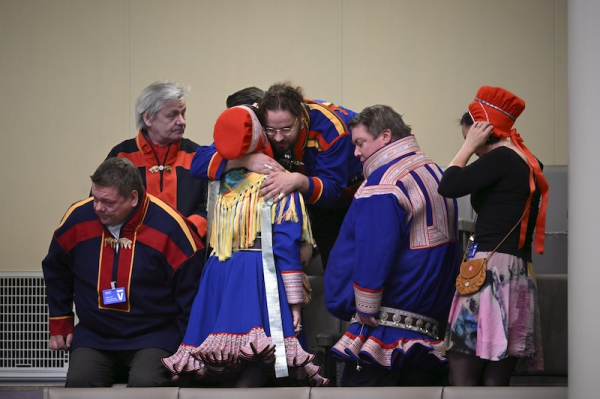
Representatives of the Sámi Parliament reacted to the vote result from the gallery during the plenary session of Parliament in Helsinki on 19 June 2025. Photo: Markku Ulander / Lehtikuva
- Next Article Finland exits landmine ban treaty amid defence shift
Finland’s Parliament has approved a controversial reform to the Sámi Parliament Act, redefining who is eligible to vote in Sámi elections and formally recognising the Sámi people’s right to determine their own political representation. The measure passed by a vote of 150 to 27 during a plenary session in Helsinki.
The reform removes the so-called “Lapp clause” from Finnish law, ending the practice of including individuals on the Sámi electoral roll based solely on historical records identifying ancestors as mountain, forest, or fishing Lapps.
Instead, voting rights will now be based on language, aligning with practices in Norway and Sweden. Voters must demonstrate that they, a parent, grandparent, or great-grandparent learned a Sámi language as their first language.
The Sámi Parliament, the representative body for Finland’s estimated 10,000 Sámi, has long demanded the change. The new law also establishes an independent appeals board for electoral disputes and tightens the obligation of state authorities to consult the Sámi Parliament on matters affecting Sámi communities and territories.
The reform follows repeated criticism from the United Nations Human Rights Committee (UNHRC), which found Finland in breach of international obligations for allowing non-Sámi individuals into the Sámi Parliament’s electoral roll against the body’s own rulings. The UNHRC had urged Helsinki to amend its legislation to ensure the Sámi people’s self-determination.
Supporters of the bill said the law protects the core rights of Finland’s only recognised indigenous people. President of the Sámi Parliament Pirita Näkkäläjärvi welcomed the decision and thanked Prime Minister Petteri Orpo for including the reform in his government’s programme. The Sámi Parliament approved the latest amendments by a vote of 15 to 3 in November 2022 and accepted changes suggested by Parliament’s Constitutional Law Committee in June 2025.
Opposition to the bill came primarily from the Centre Party, whose entire parliamentary group voted against the reform. Three coalition MPs also voted against: Heikki Autto (National Coalition Party), Sara Seppänen, and Juha Mäenpää (Finns Party). All had previously signalled their opposition and reportedly did not receive permission to vote against their respective party lines.
Critics argue that removing the Lapp clause excludes certain individuals with historical ties to Sámi culture, thereby creating exclusion within the minority. Johanna Ojala-Niemelä of the Social Democratic Party and Harry Harkimo of Movement Now also voted against the bill.
Efforts to reform the law had failed in three previous parliamentary terms. A previous attempt by former Prime Minister Sanna Marin’s administration was blocked due to internal resistance from the Centre Party. Time ran out before the bill could be passed.
The new legislation seeks to draw a clear distinction between cultural identity and political eligibility. It does not define who qualifies as Sámi in broader terms, but strictly determines who can vote and stand as a candidate in Sámi Parliament elections.
Supporters argue that this distinction allows the Sámi to focus on cultural preservation, language revival, and adapting traditional livelihoods to climate change, rather than political conflict over identity. The Sámi Parliament meets at the Sajos Cultural Centre in Inari and functions as the highest authority representing Sámi in Finland.
HT
- Next Article Finland exits landmine ban treaty amid defence shift
Source: www.helsinkitimes.fi
